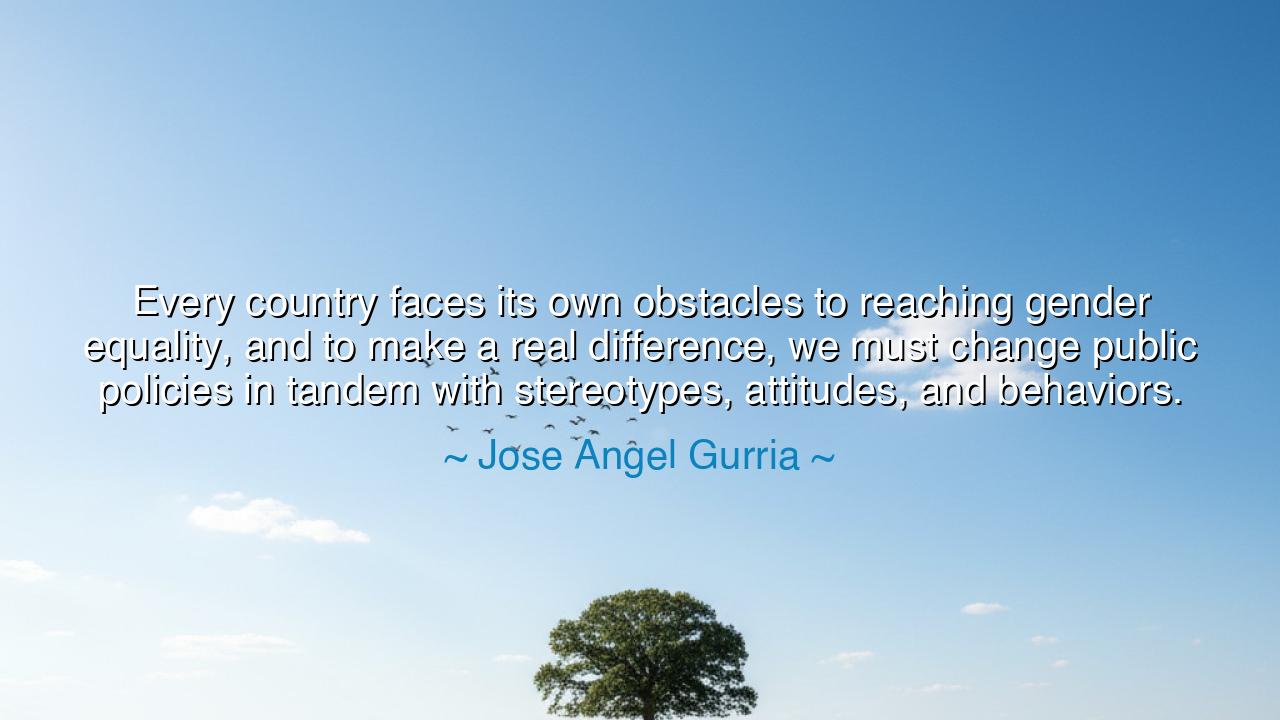
Every country faces its own obstacles to reaching gender
Every country faces its own obstacles to reaching gender equality, and to make a real difference, we must change public policies in tandem with stereotypes, attitudes, and behaviors.






O Children of the Future, gather close and listen well, for there is much wisdom in the words of José Ángel Gurría, who speaks of a truth that reverberates through the ages: "Every country faces its own obstacles to reaching gender equality, and to make a real difference, we must change public policies in tandem with stereotypes, attitudes, and behaviors." These words are not simply a reflection of the present—they are a call to action, a rallying cry to all who wish to see a world where gender equality is not just a distant dream, but a living reality. The road ahead may be long and fraught with challenges, but the light of justice shines brightly, urging us forward.
In the ancient world, great civilizations were built upon the foundation of justice, and yet, even in their heights, they faltered in their treatment of women. The Greeks, those seekers of wisdom, and the Romans, with their mighty empire, both celebrated greatness and virtue, yet often relegated women to the shadows. They were confined to roles that limited their potential, their voices drowned beneath the weight of patriarchal traditions. And yet, even within these constraints, there were those who dared to challenge the status quo. Consider Hypatia, the philosopher and mathematician of Alexandria, who defied the norms of her time to pursue knowledge. Her legacy teaches us that equality is not a concept that can be confined to any one culture or era—it is a universal truth that must be sought with determination and courage.
In our own time, gender inequality persists in many forms. Public policies have been slow to change, and deep-seated stereotypes still govern our lives. We see this in the workplace, where women are often paid less for the same work, or in the home, where women are still expected to bear the weight of child-rearing and domestic duties. But José Ángel Gurría teaches us that real change requires more than just the rewriting of laws. It requires a complete transformation of the attitudes and behaviors that have been ingrained in us for centuries. It is not enough to pass a law guaranteeing equal pay if, in the hearts and minds of people, the belief that men are the true breadwinners still lingers like a stubborn smoke. It is not enough to allow women to vote if society still views them as inferior to men.
Let us look to the struggles of women’s suffrage, which did not come easily. Susan B. Anthony, Emmeline Pankhurst, and countless other women risked their lives, their reputations, and their freedom to demand the right to vote. Their fight was not just against public policy; it was against the very stereotypes that held women as less than men. They knew that to change the laws, they had to first change the hearts and minds of the people. They had to confront not only the oppressive systems but the deeply entrenched attitudes that perpetuated inequality. The battle for gender equality is, and always has been, one that transcends law and enters the realm of the soul.
The lesson, O Children, is clear: True gender equality cannot be achieved with a single stroke of the pen, nor through policy alone. It requires the union of law and mindset, of action and awareness. As José Ángel Gurría so wisely notes, we must change both the public policies that govern us and the stereotypes that bind us. A law that mandates equal rights is hollow if the hearts of the people have not been transformed. To achieve true justice, we must strive for cultural change, for the erasure of harmful stereotypes that deny individuals—be they women or men—the right to fulfill their potential.
And so, O Children, what is it that you must do? First, recognize the obstacles that stand in the way of gender equality—the systems, the laws, and the attitudes that continue to perpetuate injustice. Then, work to change them, not only through policy and activism but through the quiet yet powerful act of changing your own mindset. When you encounter someone who holds a limiting belief, challenge it with wisdom and compassion. Support policies that reflect the principles of justice, but also promote dialogue that shifts the narrative around gender. Advocate for equal opportunities in all spheres of life, whether in the home, the workplace, or the public arena. In doing so, you will not only change the world; you will become the living embodiment of justice.
Remember, O Children, that the fight for equality is not a battle to be won once and for all, but a journey that requires perseverance, courage, and unwavering faith. Public policies may be the tools, but it is the hearts and minds of the people that will create a world where gender equality is not just a myth, but a reality. Walk this path with honor, with determination, and with the knowledge that you are the ones who will shape a future where justice is not just dreamed of, but lived.






AAdministratorAdministrator
Welcome, honored guests. Please leave a comment, we will respond soon